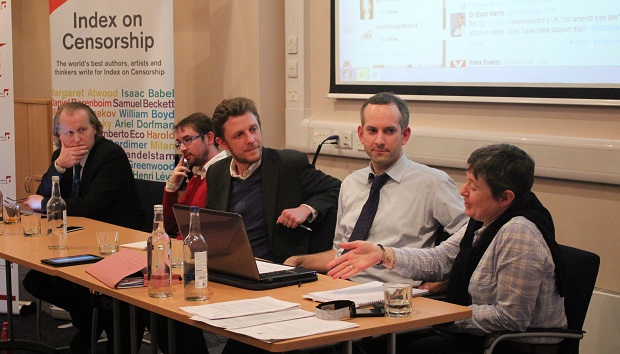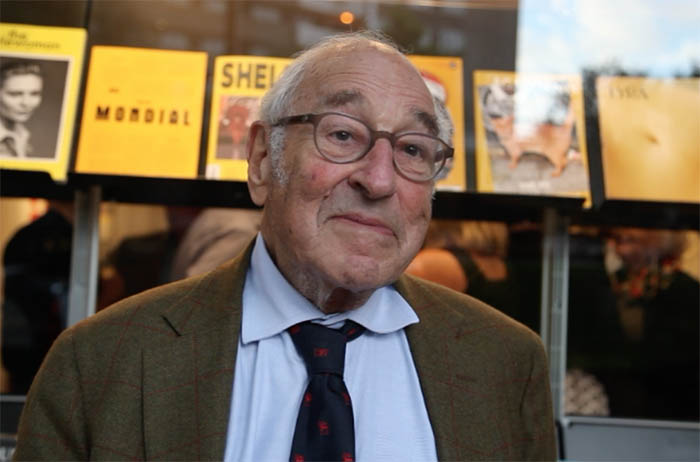20 Feb 2014 | Europe and Central Asia, News and features, United Kingdom

The panel from left to right: Gavin Millar QC, Tom Phillips, Padraig Reidy, Jonathan Heawood and Gill Phillips (Image: Georgia Hussey)
A new press regulator, with or without statutory underpinnings, would not stop another scandal like phone hacking from happening, an Index on Censorship panel said yesterday. The panel, consisting of Gill Phillips (Legal Director, Guardian Media Group), Gavin Millar QC (Doughty Street Chambers), Jonathan Heawood (Director of the Impress Project), and Tom Phillips (Senior Writer, Buzzfeed UK), chaired by Padraig Reidy, spoke at a Doughty Street Chambers and Index on Censorship debate on press freedom in the UK after the Leveson inquiry.
“In terms of the institutions that failed over phone hacking, the Press Complaints Commission doesn’t even make it onto the podium,” said Tom Phillips. “So the idea that any kind of regulation was ever intended to be the solution to this is missing a whole bigger picture.”
If you set up a system to stop something “human ingenuity and imagination” will find a way to get around it, said Gavin Millar QC. He added that the best regulation “has to come from the heart”, and was worried about the complicated rules surrounding regulation taking the responsibility away from those “who are putting the stuff out.”
Jonathan Heawood argued that we can make press abuses “less likely” though a “good, intelligent, intelligently applied regulator” and “sufficiently enforced, sufficiently clear sanctions”. He added that regulation is “part of the solution” to improve conditions allowing public interest journalism to flourish.
Press regulation took centre stage at the event, but wider issues of press freedom were also discussed. Gavin Millar pointed out how the UK’s debate on press freedom and press regulation may be perceived in authoritarian countries, while Tom Phillips warned that ignoring the evolving social norms of the internet age bad is for press freedom. Gill Phillips argued that while the UK isn’t as bad on press freedom as some other countries, “where we’re going” and “the threat of criminalisation that effects every day journalism” is worrying.
The event took place ahead of the release of Index on Censorship’s policy paper Life after Leveson: British media freedom in 2014. The paper acknowledges that the recent change in libel law was good for this country’s press freedom, “the record of successive governments have been far from perfect” and “there are still several areas where this government can act to safeguard the free press and free speech more broadly in the coming year.”
It was a timely discussion, as yesterday the High Court dismissed David Miranda’s challenge to his detention at Heathrow under the Terrorism Act in August. It was also the day former News of the World editor Rebekah Brooks took the stand in the ongoing hacking trial.
“The [Miranda] judgement has some wide ranging views downgrading journalism in the 20th century that I find personally bizarre,” said Philips. Millar said the judgement shows how the “remaining tendency of government using the possibility of court proceedings against newspapers to stifle the publication of state secrets” has a “chilling effect” on press freedom.
The sold-out event encouraged audience interaction, which made for a lively and at times heated, debate. One comment from the floor argued the panel had missed the point — that the debate was about press abuses, and a regulator was the minimum step that had to be taken. Another audience member questioned the press calling for regulation of other industries, but not wanting to be regulated themselves. The Guardian’s Roy Greenslade argued that we need to separate those issues of press abuse that can be tackled through the law and those that must be tackled by self-restraint on the part of the media. Observer columnist Peter Preston said the Royal Charter regulator would be part of a “conspiracy of chaps”.
The discussion also took place on Twitter, under the hashtag #LifeAfterLeveson
This article was published on 20 February 2014 at indexoncensorship.org
1 Jun 2012 | Leveson Inquiry, News and features, United Kingdom
 The Leveson Inquiry should not forget the need to protect British journalism, says Marta Cooper
The Leveson Inquiry should not forget the need to protect British journalism, says Marta Cooper
(more…)
17 Jan 2012 | Leveson Inquiry
Private Eye editor Ian Hislop has spoken out against further press regulation, arguing that “if the state regulates the press then the press no longer regulates the state”.
Hislop told the Leveson Inquiry that the British press faces substantial regulation, adding that the worst excesses of the press occurred due to poor enforcement. He highlighted that many of the “heinous crimes” addressed by the Inquiry, namely phone hacking and contempt of court, are already illegal.
“I believe in a free press and I don’t think it should be regulated, but it should abide by law,” he said.
Hislop also lamented the “deeply embedded” involvment among senior politicians and News International, and urged Lord Justice Leveson to call the Prime Minister, Tony Blair and Gordon Brown to give evidence.
During his evidence, which at times resembled a debate than testimony, he alluded to France’s stringent privacy law, which he labelled “draconian”. The French “are catching up with two decades of news because of the reluctance to look at private lives of people who ran them”, he said.
Hislop also spoke out against prior notification, detailing how, when stopped from running a story about Law Society president Michael Napier, his magazine spent £350,000 while the application for an injunction went through. “The lesson I learned was not to give prior notification,” he said, adding later that privacy had become “more of a problem than libel” in the UK.
Yet he called libel arbitration a “waste of time”, noting he would “rather end up in the courts because that’s where you end up anyway.” He told the Inquiry that, since 2000, his magazine has faced 40 libel actions.
Also speaking this morning was News International CEO Tom Mockridge, who took over from former chief Rebekah Brooks in the wake of the phone hacking scandal last summer. Mockridge upheld the British press for “its extent of competition, choice and ability to report with freedom”, noting that many outside the country look at the press with “jealousy”.
Following a discussion of the regulatory models of Italy and Hong Kong, Mockridge disagreed with Lord Justice Leveson’s distinction between state regulation and a mechanism of statutory backing in a self-regulatory body. “If the state intervenes, the state intervenes,” he said, noting that it would “diminish a free press”.
Follow Index on Censorship’s coverage of the Leveson Inquiry on Twitter – @IndexLeveson
20 Sep 2018 | News and features

Louis Blom-Cooper at the launch of the 250th issue of Index on Censorship magazine at MagCulture, London, July 2016
Index on Censorship is deeply saddened by the news that Louis Blom-Cooper, one of the earliest supporters of our organisation, has passed away. The lawyer, human rights defender, free speech advocate and journalist died Wednesday at the age of 92.
Born in London in 1926, Blom-Cooper was called to the bar in 1952, where he championed and helped secure prisoners’ rights and campaigned against the death penalty. Doughty Street Chambers, the human rights firm that he later spent many years working at, said in a tribute to Blom-Cooper at his 90th birthday:
“It was he who first challenged the mandatory death penalty throughout the Commonwealth, raising arguments decades before they came to be accepted by the Privy Council.”
In 1961 he helped found Amnesty by supporting an appeal for amnesty for political prisoners and getting this appeal publicised in the Observer. Then, in the 1970s he became involved in the establishment of Index. For the 250 issue of Index on Censorship magazine, published in 2016, Blom-Cooper wrote about why he initially became involved with the organisation and why it is still needed today. He said:
“If one views the current scene of censorship, whether it be self-censorship or state intervention on individual speech, one is struck by its intrusion elsewhere – in universities and other paragons of human knowledge. There is much to be concerned about. The ambit of freedom of speech, which may be qualified by other public interests, needs close examination and protection from other interests that do not apply as qualifications of the proposed rights. It is a core function of Index to scrutinise the scope of Article 10 of the convention. At a time when the convention is under threat of extinction (as some ministers aver) or modification by a domestic bill of rights (as other ministers might claim) vigilance is called for. The road is clearly marked ahead, without any diversionary influence that smacks of authoritarianism.”
He also attended the London launch of the issue, where he gave an emotive speech about still being involved with Index decades later. Watch the clip here.
Unsurprisingly, Blom-Cooper was known fondly for his fierce intellect and love of debate and in this first article for Index on Censorship magazine, published in 1977, these qualities shine. Here he has a fruitful back-and-forth with the philosopher and critic Stuart Hampshire about the exact definition of the word “censorship”.
Blom-Cooper, who was former chair of the Press Council, was not just an ardent defender of free speech but an ardent defender of the freedom of the press. In 1992, he wrote in the magazine about the future of press regulation in Britain.
He was later interviewed for the Index website on the Leveson Inquiry.
Blom-Cooper was also independent commissioner for holding centres in Northern Ireland and wrote this article in the magazine in 1997.
Jodie Ginsberg, CEO of Index on Censorship, said: “I had the privilege to meet Louis Blom-Cooper when I first started at Index and was inspired by his still unstinting commitment to freedom of expression and the need to tackle censorship worldwide. We strive daily to defend the freedoms that he believed to be so important in creating a better society.”
Click here for more information on the founding of Index on Censorship.



